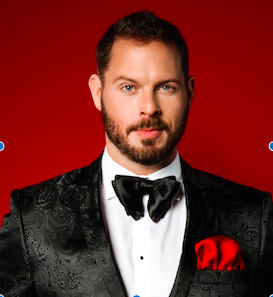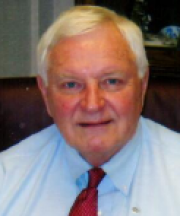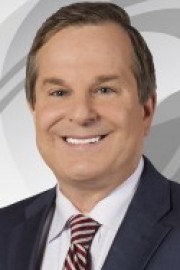Theatrical and Documentary Film Producer
Mentor- Jay Krottinger
 Jay and his partner Ryan Tanner founded Square 1 Theatrics in 2012 to produce entertainment that is thought provoking and able to inspire social change. Square 1 has produced regional and Broadway works in collaboration with other producers that include the 2012 production of Flipside: The Patti Page Story that played in Oklahoma and off-Broadway, the 2013 Broadway revival of Pippin that won four Tony Awards including best revival of a musical, the 2015 London production of Memphis the Musical that won two Laurence Olivier Awards and was nominated for eleven, the 2016 Broadway musical Waitress that was nominated for four Tony Awards and the Broadway play A Time to Kill. They are currently working on a new Broadway musical Come From Away that will open in early 2017 and are developing a 4 person off –Broadway show and a documentary film Body Electric. They have done all this in just four years.
Jay and his partner Ryan Tanner founded Square 1 Theatrics in 2012 to produce entertainment that is thought provoking and able to inspire social change. Square 1 has produced regional and Broadway works in collaboration with other producers that include the 2012 production of Flipside: The Patti Page Story that played in Oklahoma and off-Broadway, the 2013 Broadway revival of Pippin that won four Tony Awards including best revival of a musical, the 2015 London production of Memphis the Musical that won two Laurence Olivier Awards and was nominated for eleven, the 2016 Broadway musical Waitress that was nominated for four Tony Awards and the Broadway play A Time to Kill. They are currently working on a new Broadway musical Come From Away that will open in early 2017 and are developing a 4 person off –Broadway show and a documentary film Body Electric. They have done all this in just four years.
Jay started out wanting to be a performer not a producer. He was an accomplished singer, dancer and actor who could have had a successful performance career. But he always had a head for business and made the transitions to producing when he went back to school to get his Masters in Music and Theater from the University of Central Oklahoma. There he had the opportunity to work with one of his teachers to produce Flipside: The Patti Page Story.
Jay has always taken the opportunity to learn from others. In his article, he tells you how he built strong personal relationships that helped him learn the business and how this kind of networking has been one of the keys to his success. But even though it is important to learn from others, Jay emphasizes that in the end you hold your own destiny and have to make your career choices for yourself.
My Career Path
My parents encouraged me to embrace my own personal and professional aspirations. They were not the kind of parents who wanted to make sure I did what they wanted. I had a well-rounded childhood and played baseball, soccer, little league football and high school football through my Junior Year. I also came from a family that was musically inclined and that always stuck with me. I took piano, singing and dancing lessons and later wanted to play different instruments and took trombone and tuba. My parents were certainly not stage parents. When I took acting lessons, I was the one making the arrangements if I was in a show. Calling people and asking just came naturally to me. I always had a very entrepreneurial spirit and was never afraid to put myself out there.
I did not come from money. I knew that while my parents would help a little, most of my college expenses were going to have to come from me getting a scholarship or tuition waiver. I did have an opportunity for a small football scholarship. But I had no other thought than being a music and theater major. All my training in music and theater was put to good use when I started applying to colleges my senior year. I interviewed with a number of colleges but fell in love with the University of Central Oklahoma. I was accepted at UCO with a full tuition waiver for a degree in Music and Music Theater. My high school class at Broken Arrow was over one thousand and coming from that large a high school made the transition to college no big deal. Before I graduated, I lined up a job working as the house manager for the Lyric Theater Company on the UCO campus and also got an apartment. I started packing two days before the last day of high school. On the last day I left the parking lot and drove to OKC. I was ready to get moving. I always like the challenge of what’s next and get anxious when I sit still.
After a couple years of college, I decided that if I was going to take the risk of going to New York City and pursue a career in musical theater I needed a plan B. So my junior year I began taking classes in business administration and marketing and completed a double minor. While I knew I wanted to perform, I also knew I wanted to be involved in the production side of entertainment at some point. I still had the desire for stardom. But I was also balancing the voice in my head. That voice told me I had to pursue performing as long as I could handle it. But because performing is a very competitive business, I also knew I needed to learn enough about the business while I was a performer to be able to apply it to being a producer later. I took advantage of the time during spring break my senior year at UCO to prepare for the NYC audition season in March of 2006. I took my two weeks of spring vacation and an additional week and pounded the pavement. I left NYC with a year and a half of contracts.
We all want to be successful when we are 22 or 23. But you have to ask yourself what is success. My standard for success was to get a job and have opportunities to work with a number of theater companies so I could make the proper connections in the business. I worked that summer for Surf Light Theater Company in New Jersey about an hour and half from NYC. I spent the entire summer looking for a job and a place to stay in the city and then moved there in 2007. I lived in New York on and off for two and a half years. But the problem is that while you live there trying to get work, the work often takes your away. I had jobs in upstate New York, New Jersey and Florida and did a couple of cruise ship jobs and even came back to OKC and performed at the Lyric Theater.
I was like a sponge learning new information when I began performing. I was taking in the environment around me and wanted to learn the entire business. I always asked questions of other people every time I was on a job. I wanted to get to know the producers, the directors and the crew and asked about marketing. I think now that subconsciously I was preparing myself to be a producer.In the spring of 2007, I was between performing jobs and working as a catering manager in NYC when I got an offer to work for nine months on a five star cruise ship in the Mediterranean. We stopped in thirteen different countries and forty-three different ports. While this was a lot of fun, that kind of light entertainment was not what I wanted to do. Anybody who is in the business will tell you that the longer you are out of NYC, the more difficult it is to come back and get work because you lose your business relationships. Almost every time you go into an audition it is not like you are going to audition for a brand new theater company. Every year you usually see the same theater companies and the same casting directors. These are the people you need to establish relationships with and the longer you are out of the city the less familiar they are with you. The truth is that in this and almost any other business, relationships do matter and it is all about who you know.
Lessons in becoming a performer: You have to differentiate yourself to be successful as a performer. You have to be clever and set yourself apart from other people in the business. You have to be original instead of conforming. The entertainment business is all about uniqueness. When you look at successful entertainers, you will see that they are extraordinarily unique and they are also someone who is very real. You are the look, your voice or your talent is the product and you have to market yourself to the consumer, which is the people who are hiring you. You have to put that product on stage in front of that consumer and have to constantly work on yourself to make sure you remain marketable to the industry. A performer is really running his or her own business and you have to think like a businessperson to be successful.
After I left the cruise ship in December of 2007, I went back to Tulsa and was going back and forth for auditions in New York. But I was also getting a little fatigued with the business. I was always working. So it was not a question of being able to get a job. But I was asking myself if I still enjoyed it and if it was fulfilling. I think most people between the age of 24 and 29 are always questioning themselves like I was. Around that same time, I met my husband and he wanted to start a business in Tulsa as a distributer of medical products. I decided to take some time off to help him. But I planned to build a new audition book and later go back to NYC.
I had a little bit of an identity struggle while I was in Tulsa. I had not been performing for a year and a half. I thought that I could either go back to NYC and spend time, money and effort getting my bearings by taking voice and dance lesions in a studio or I could go back to UCO and get a Masters and more disciplined training. I decided to go back to school and get a Masters in Music and Music Theater. The program was flexible enough that I could focus on things that were the most interesting to me. I went back to NYC in the summer of 2011 and got a job for eight weeks at a wonderful regional theater company in Rhode Island playing Corney Collins, a central character in the musical Hairspray. Here I was doing a gig in an equity theater with actors who had either just gotten out of Broadway shows or were on a hiatus from a show. These were people who had been in multiple Broadway shows their entire careers and were doing the same thing I was. That was one of the things that happened around that time that made me change my mind about performing. I also found that I had one problem that was holding me back from being cast as a leading man. I was in my late twenties but I always looked about ten years older. So I was up against men in there thirties with more experience and was going to have to wait until they aged out before I would be cast as a leading man. That was hard for me and I didn’t like doing it. If I had stuck with it, I probably would have eventually been cast as a lead in a first or second national tour of a Broadway production. I also auditioned for two plays in NYC where I was being considered for two road tours. It got down to where I was one of the last few people who were being considered for different roles. I had spent a lot of time building relationships with the casting directors and the directors of the shows and was optimistic. But I didn’t get cast for any of them. Three weeks later, I saw who was picked. I knew who they were, knew their level of performance and took it personally because I knew that I was better and should have been cast in those roles. I thought who in their right mind would spend the majority of their career being told no when the answer should have been yes. I knew that I had the ability to be successful, appreciated and personally fulfilled doing something else in the business or another business. It was after those experiences I discovered that I was probably going to end up producing. I you had asked any of my professors while I was going to college, they would all have told you that I would be a producer and that they would all be working for me. But it is so hard when you are in an educational environment to take the advice people are giving you. I just never wanted to hear that because my goal was to perform and at the time the idea of me producing seemed like I was a failure.
While I was working on my Masters at UCO, I was also a graduate assistant to Dr. Greg White. He was working on an original musical that he had written called Flipside: The Patti Page Story with her original music. He had done a world premiere at UCO that has gone very well and felt there was an opportunity to go further. I was sitting with him in a restaurant one day looking on the Internet at opportunities to take it to an off Broadway theater or a regional theater. I just picked up the phone like every time I am trying to figure something out and with gumption called an off Broadway theater and asked if I could speak to the producing director. She immediately called back and said she would love to learn more and to send her a script and information on the show. She called back a week later and said she had a six-week slot beginning December 12th. We immediately threw together a rough budget and put together $120,000. That was my first experience producing when I co-produced that show with Dr. White. I helped him get it to NYC, raise the money and experienced everything involved in grass roots producing.
Our attorney at the time we brought the Pattie Page Story to New York was also representing Pippin, which was in the process of being revived. I went to meet him for coffee in November of 2012 when we were scouting theaters and he asked if I would like to come and see a Broadway rehearsal for the revival of Pippin and talk about an opportunity. I called Ryan and asked him to come with me. The theater was by Union Square and able to handle a show that was aerial and acrobatic. The director walked us around the theater and we talked to the costumer who had a binder that was six inches thick. We were exposed to the entire script, the costumes and all aspects of the production. We sat down in the theater and got to watch them choreograph the opening number to Pippin and saw all that come together. Afterwards I asked the producer what was the opportunity. When he told me I said we were in. For me it was very special because it honestly couldn’t have been more perfect. The setting and how the opportunity was presenting itself reinforced to me what I was supposed to be doing. I felt at home watching it all happen and sitting next to the director and producers. Ryan and I raised the money for our participation and we won a Tony award five months later as co-producers while the show won three other Tony awards. Every producer and writer team thinks their production is going to be successful just like any oilman thinks they are going to drill a successful well. But a producer may take a show, raise a bunch of money, put the show on Broadway, get bad reviews and it closes just like the oilman drills a dry hole despite all the good geology. There is a whole lot at stake in both cases and you can win big and lose big. I have done both.
We went on to co-produce Memphis the Musical in London in 2015 that won two Laurence Olivier Awards and was nominated for eleven, the 2016 Broadway musical Waitress that was nominated for four Tony Awards and is still running and the Broadway play A Time to Kill. Two of the four productions have been both commercially and financially successful.
Life Lesson: Anyone at any age who has mental maturity has to wrap their head around the fact that you have to make your career by doing it yourself. You should take the opportunity to learn from others. But you hold your own destiny. For example, if you choose to not go to college there is nothing wrong with that. I know of many people in entertainment who went directly from high school into performing and are highly successful in stage or in film. They found their niche and capitalized on it making a good living and being well recognized for their work. I know people in other industries who have done the same. We all have control of that part of our own careers. But my experience is that college will give you a lot of training that can be important for many people to help them learn more about their career and about themselves. I recommend everyone who can afford it try to go to college even if you haven’t decided on a major or have an idea in your head about what you want to study. College sharpens your intellect, it well rounds your mindset on business and life and it exposes you to reality. The other truth is that anytime you go to look for a job and there are two candidates who are just as capable, the one with the college degree will usually be considered over the one who does not. People recognize that everyone who has gone through any formal education knows what it takes to begin and end a task and thinks there is value in that. Even though college is expensive, I look it as ledger debt that is an investment in yourself that you will have with you for the rest of your life that nobody can take away from you.
The Role of a Producer
We have two major responsibilities producing a show:
1. We have a responsibility with our investors to make sure the show checks some of these boxes that are common to all successful works:
- Why does it matter?
- Why does anyone care about it?
- Who is it going to inspire?
- We also feel that we have a responsibility to bring pieces to the forefront that make a difference and mean something to society.
Producers work at many different levels in theater and film. There is a financial portion of being a producer where you can just raise money and get a portion of the return or a finder’s fee. There is also a side of producing that is highly involved. Every single musical you see on Broadway goes through a development process. That begins with the author and a story that may be original or may have been adapted from a book or movie. There is also a composer and a lyricist. They invite people into a workshop where producers see incubator pieces. If one or more of the producers think the show is worthwhile developing, they will begin working with the writer, composer and lyricist to develop the show at several different levels. It takes a long time to go from this initial stage to opening on Broadway. The average musical takes seven years before full production.
Producers are also involved in other kinds of live entertainment like a magic show, acrobatic productions and pop artists. Take a pop artist as an example. A producer discovers these people, signs them to a contract and exposes them to the right people. They develop an album and pretty soon they have a live tour. Like a musical, a team comes together not just the singer/songwriter. There is a choreographer along with a director and the producer coordinates all this. In film, the producer works a little differently. There is a line producer who understands all the facets of the budget including things like the travel budgets and pre and post editing and hires the sound crews and film crews that work on a picture. There are also producers who only raise money and understand the market. They work as a CEO at a production company like Paramount or Warner Brothers.
I have developed wonderful relationships with a lot of the producers who let us be involved at the early stages. They want our opinion not just our money and our opinion has some impact. One thing you do not want to do in the entertainment industry is develop something in a bubble. Having many different eyes on a storyline and all the other aspects that makes it appealing to a mass audience is important.
Square 1 Theatrics Current Projects
Right now I am a general partner for a piece called #World Problems. It will be a four person off Broadway show. We have done four readings and are developing it with the lyricist and have invited industry folks in to get their opinion, garner some interest and give us real live feedback. We are essentially doing market research and want to determine if the show really has legs. We also want to know if it is something others agree is relevant and will move people enough to get them to buy tickets.
We have another show that is going to be opening next year on Broadway called Come From Away. It is a musical about some airplane passengers who were diverted to Nova Scotia on 9/11/2001. It is so different and so unique and pays a huge honor to the victims of 9/11. I am feeling very good about it prospects. The company was completely funded before its second developmental production. We only were able to get half the participation we had originally requested.
Ryan and I are also working on our first documentary called Body Electric that focuses on body image issues and asks the question: What is the obsession with the way we look? Body image is something that we all deal with everyday and we all ask what are we going to look like as we get older. Our objective when we do documentaries is that it has a truth and attraction to a large adult audience so we can get an organization like HBO or Netflix to purchase and distribute it to a large audience. The nice thing about film compared to theater is that in theater you have to raise a certain amount of money before you can do certain things where in film you can raise money as you go because there is not that harsh a deadline.
Another production we are still working on is Waitress. It is currently running on Broadway with Jessie Mueller as the lead. She was nominated for the 2016 Tony for best actress for her role in this musical. Ryan and I were invited to the industry reading of Waitress, which means that the show has been developed to the point where the score is pretty solid and there is a full arc of all the songs, the script is there and it can be directed into something that is real. The show was directed towards the biggest ticket audience, the female buyer. There were about 400 people invited. We came and saw the reading and afterwards Ryan and I had our differences. We spent about nine months negotiating to get the terms we wanted and Ryan insisted that we do it. We went ahead and I am happy we did.
What Measures Success?
Pippin was both a commercial and a financial success. The show received several Tony awards. Plus all of our money was returned to our investors and we made a profit from both the Broadway production and the national tour.
Another show we got involved in was Memphis that opened in London’s west end. It was our first international production. When it was on Broadway in 2009 it won four Tony awards including Best Musical. It ran for three years on Broadway and turned a profit. We co-produced Memphis in London in 2015 with the same team that produced it in New York. It was nominated for nine Olivier Awards, whichare equivalent to the Tony, and won two. The show was well received but it returned only about thirty percent of the investment. Two other good shows were being produced at the same time in London and the audience was split between the three. So while it was a commercial success from the standpoint that it was critically acclaimed, did not lose money and everybody loved it, it was not a financial success.
If you have a show that is going to be on Broadway it will always have licensing rights for ten or twenty years or longer and subsidiary rights meaning that anytime it is produced at a later date some portion of the profits go back to the original producers and are distributed to the original investors.
Developing Relationships and Networking
As I said earlier, a lot of business is the people you get to know. The key component to meeting people and developing relationships is being socially available. That means you form relationships not just because you want something. It is about developing a solid, trusting relationship with someone. It is a delicate balance between friendship and a business relationship. I never think of getting to know someone so I can present an opportunity to him or her. It is about getting to know someone and understanding the type of relationship. It might be the person is someone you want to lean on for advice and who will be a mentor to you or someone who sees an opportunity in you. People invest with Ryan and me because they say they believe in us and want us to be successful. So developing relationships is just about being you and being open and honest. My partner and I approach every day with an open book and try to be honest and true. You too should be authentic and always get to know somebody. Will Roger was able to say he never meet a man he didn’t like because he allowed himself get to know somebody and enjoy at least one aspect of them regardless of whether he agreed with them religiously, politically, business wise or personally. That is how I try my best to get to know individuals.
US Bureau of Labor Statistics for Producers and Directors
The median annual wage for producers and directors was $68,440 in May 2015. The median wage is the wage at which half the workers in an occupation earned more than that amount and half earned less. The lowest 10 percent earned less than $31,780, and the highest 10 percent earned more than $181,780.
In May 2015, the median annual wages for producers and directors with five or more years experience in the top industries in which they worked were as follows:
Advertising, public relations and related $93,000
Motion picture and video industries $77,900
Cable and other subscription programming $72,200
Performing arts. Spectator sports and related $72,020
Radio and television $56, 200
Some producers and directors earn a percentage of ticket sales. A few of the most successful producers and directors have extraordinarily high earnings.
Job Outlook
Employment of producers and directors is projected to grow 9 percent from 2014 to 2024, faster than the average for all occupations. Some job growth in the motion picture and video industry is expected to stem from strong demand from the public for more movies and television shows, as well as an increased demand from foreign audiences for U.S. produced films. Also, consumer demand for reality shows on television is expected to increase, so more producers and directors will be needed to create and oversee editing of these programs. In addition, production companies are experimenting with new content delivery methods, such as watching TV on mobile devices and online, which may lead to more work opportunities for producers and directors in the future. These delivery methods are still in their early stages, however, and their potential for success is not entirely known.
Theater producers and directors who work in small and medium-sized theaters may see slower job growth because many of those theaters have difficulty finding funding. Large theaters in big cities, such as New York and Los Angeles, which usually have more stable sources of funding, should provide more opportunities.







